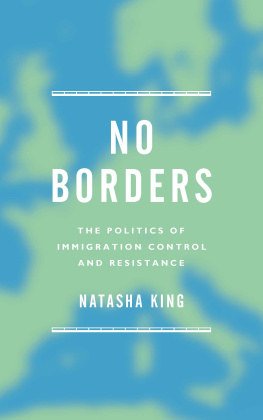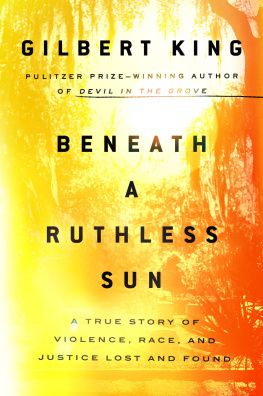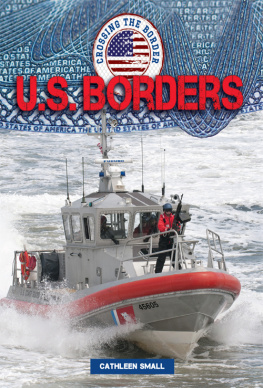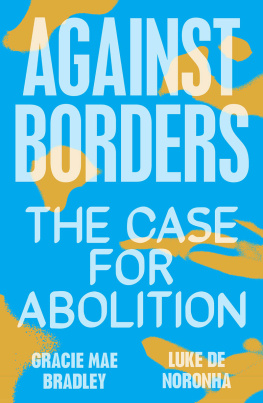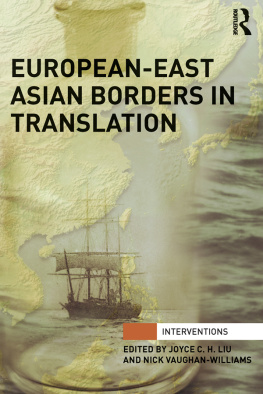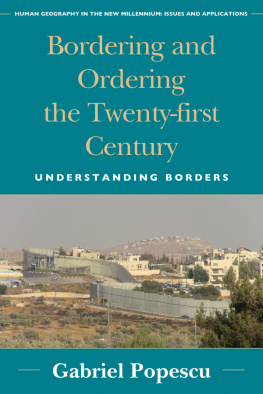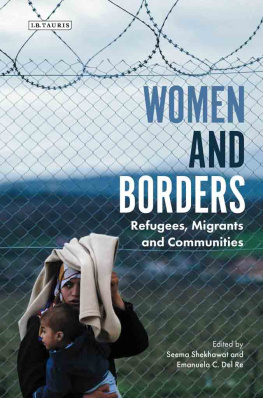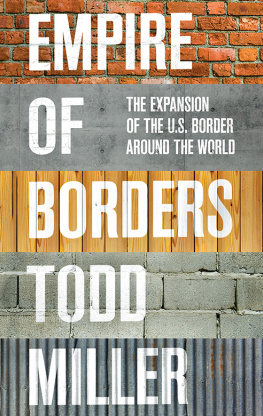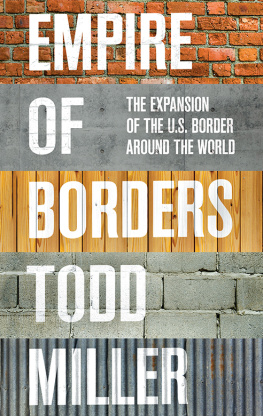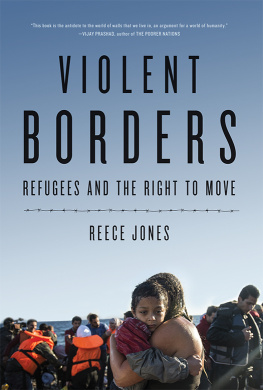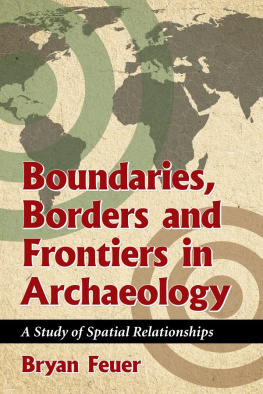More Praise for No Borders
A gift to all of us who yearn for relevant theory to help us take more effective action, this is an inspiring call to join communities around the world and work for the full realization of human rights rooted in the values of solidarity and the inherent worth and dignity of all.
Chris Crass, author of Towards Collective Liberation
Borders have failed to contain a world in motion or offer a just settlement for millions of people. What is politics in the wake of this double failure? With its focus on new forms of social movement and political action, No Borders will prove vital reading for anyone seeking answers.
William Walters, Carleton University
About the author
Natasha has been involved in a lot of different expressions of the struggle for the freedom of movement, in the UK, Calais and elsewhere. Natasha would like to call herself an author but isnt sure if you can do that after finishing your first book. She hopes this will be the first of many.Natasha has a PhD in politics from the University of Nottingham, Centre for Social and Global Justice. She is from the south of England and is based in Nottingham. Right now she is travelling around Europe exploring different kinds of autonomous communities.
NO BORDERS
THE POLITICS OF IMMIGRATION CONTROL AND RESISTANCE
Natasha King
No Borders: The Politics of Immigration Control and Resistance was first published in 2016 by Zed Books Ltd, The Foundry, 17 Oval Way, London SE11 5RR, UK.
www.zedbooks.net
Copyright Natasha King 2016
The right of Natasha King to be identified as the author of this work has been asserted by her in accordance with the Copyright, Designs and Patents Act, 1988.
Typeset in Plantin and Kievit by Swales & Willis Ltd, Exeter, Devon
Index by Ed Emery
Cover design by Clare Turner
All rights reserved. No part of this publication may be reproduced, stored in a retrieval system or transmitted in any form or by any means, electronic, mechanical, photocopying or otherwise, without the prior permission of Zed Books Ltd.
A catalogue record for this book is available from the British Library.
ISBN 978-1-78360-468-5 hb
ISBN 978-1-78360-467-8 pb
ISBN 978-1-78360-469-2 pdf
ISBN 978-1-78360-470-8 epub
ISBN 978-1-78360-471-5 mobi
CONTENTS
And as capital retreats deeper and deeper into cyberspace, or into disembodiment, leaving behind itself the empty shells of spectacular control, our complexity of anti-authoritarian and autonomist tendencies will begin to see the re-appearance of the Social.
Hakim Bey (2009)
Maybe this whole situation will just work itself out
Artwork in the Calais jungle, Banksy (2015)
Locating the issue
I started writing this on the same day that reports came in of up to seven hundred people drowning in the Mediterranean Sea after an overloaded boat carrying people from Libya to Italy capsized (
The figures were horrific, but this crisis didnt begin NOW. People had been clandestinely crossing the Mediterranean Sea from North Africa or the Aegean Sea from Turkey since the early 1990 s. This was the same struggle that had been going on for more than two decades, just on an unprecedented scale. The mainstream story was effectively the same : an apocalypse, with those on the boats signalling the presence of a vast horde of people just waiting for their chance to cross to Europe; of victims recruited by merciless smugglers, the solution largely lying in combating illegal migration through more controls. In this way, the human crisis that was a problem for migrants became presented as a migrant crisis that was a problem for European governments.
The ironic presentation of certain kinds of travellers (the ones European states claim not to want) as victims of circumstance before they reach Europe and criminals set on stealing our resources after they arrive still dominates. What this discourse smuggles in unnoticed is the sense that border controls are somehow natural, timeless and realistic. What this discourse passes over, too, is how the controls that are deemed so necessary to stem the flow of unwanted migrants actually create the problem of illegal migration.
We live in a world where the movement of the global poor is increasingly seen as a problem and restricted ().
A few weeks after the disaster in the Mediterranean, I was in Calais, in a self-organized camp of people trying to cross to the UK. Sitting in a friends house in the camp drinking tea together, we talked about how the number of people living there had swelled in recent weeks from a thousand or so to double that. All these new arrivals had put pressure on those already living there. My friends group had doubled to around thirty, forming an ordered unit of people combining their resources and labour in order to feed and look after each other. Many of these new arrivals were those people who had made the headlines weeks before. Their boat-crossing had been just a fragment of their journeys. Now they waited in Calais for their chance to reach the UK and make a happy ending to what were often years-long journeys.
I mention this because this book is not really about border controls, but about how people find ways to practise the freedom of movement despite such controls. Its a book about practices for free movement, against the border. Because border controls are and have always been ). March 2015 saw simultaneous hunger strikes in eight detention prisons across the UK, accompanied by a similar wave of solidarity actions. In June that year, a camp of people trying to cross was joined by solidarity activists to form a No Border camp in Ventimiglia, on the Italian side of the border with France. The camp lasted for a further three months. These are just a few examples of the ways that people denied the freedom of movement, and those in solidarity with them, have taken action.
And then there are all the people who keep on moving without permission. Because to only pay attention to visible and organized activities is to see only the smoke rising from the volcano (
Paying attention to these practices doesnt mean being blind to the operations and consequences of control. I have already talked about how people travelling without permission die in their efforts to cross borders. They are routinely and indefinitely imprisoned if they make it to Europe. They face numerous ways that limit their lives and bar their access to society should they manage to remain (in the UK this means no legal access to work or free healthcare, and living with the continual risk of detention and deportation). Such things produce violent and traumatizing effects. The development of mental illness after arrival is common, as is self-harm and suicide (). Yet without discounting all this, even under intense restrictions, acts of liberation still happen .
People protest together and affirm that No-One is Illegal!; others mount hunger strikes that contest their detention; others maintain safer houses where travellers can stay; still others pass on information about the safest routes and means of passage. All these activities reflect a refusal to be denied the freedom of movement in different ways. These practices form part of the movement against borders, or the no border movement, and this movement is diverse.
Thinking of no borders as a refusal brings into focus how the legitimacy of border controls is also questioned, and hence the legitimacy of the nation-state. People move for a variety of reasons. I cant imagine anyone ever moves in order to challenge the state, and Im not suggesting that every act of migration is an act of liberation. But, in the act of moving without permission, or in actively contesting controls that limit their lives, people refuse the border and oppose the state at that moment . The struggle for the freedom of movement is this refusal of the border. I label this a no borders politics and explore what it is as a concept in Chapter .

